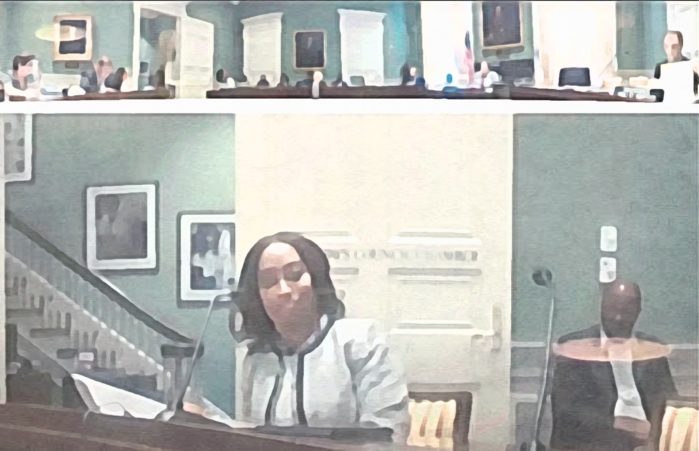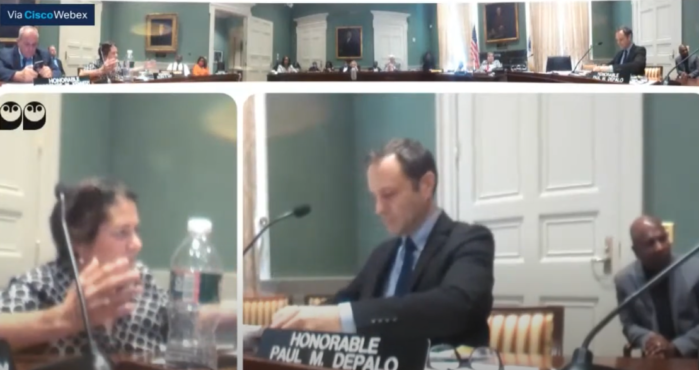
This is who your governor thinks should make these critical decisions
UPDATE (July 29): For the first time in Gov. Charlie Baker’s two terms, on July 28, the Governor’s Council rejected the governor’s pick for the Parole Board in a 5-3 vote. Voting for nominee Sherquita HoSang were Councilors Joseph Ferreira, Mary Hurley, and Terrence Kennedy. Voting against were Marilyn Devaney, Paul DePalo, Robert Jubinville, Christopher Iannella, and Eileen Duff. Duff, in an email said, “The MA Parole Board has been put on notice that things need to change dramatically and fast. Justice delayed is Justice denied and the citizens of the Commonwealth are asking for The board to do their jobs in an efficient and fair way which frankly isn’t much to ask.”
“I am not sure you have done enough homework to be sitting in this seat.”
Those were the words of Governor’s Councilor Eileen Duff on July 21, spoken to Massachusetts Parole Board nominee Sherquita HoSang during a three-hour long hearing, after HoSang said that she had never attended a Parole Board hearing in person or read any parole decisions regarding life-sentenced prisoners (that are published on the Parole Board website).
The elected eight-member Governor’s Council must approve all gubernatorial noms for judgeships, clerk-magistrate positions, public administrator spots, and members of the Parole Board, among other deliberative positions.
“If you get this job, you are going into a maelstrom,” Duff added.
HoSang was nominated to the Parole Board, an agency within the Executive Office of Public Safety authorized to grant paroles, supervise those on parole, and recommend clemency applicants to the governor. Gov. Charlie Baker nominated HoSang on July 15 to fill an opening vacated in March by former prosecutor and now assistant clerk magistrate of the Springfield District Court Karen McCarthy. McCarthy lasted less than two years and chose not to seek renomination to a body that Duff called “inept and incompetent” in her first few minutes of questioning HoSang.
As Prisoners’ Legal Services Executive Director Elizabeth Matos said in 2019, during another questionable Parole Board appointee process, “Parole is not being used as a public safety tool the way it should be.” That continues to be the case. Besides not responding to applications for pardons which forgive one’s underlying crime, the Parole Board is failing to respond to petitions from prisoners for commutations, which leave the conviction intact but reduce the punishment. Both commutations and pardons must be heard by the Parole Board and approved before they’re sent on to the governor for his signature. Baker has not issued a commutation in all of his five-and-a-half years in office.
HoSang, born and raised in Springfield, is the latest proposed appointment. She has served on the state’s Sex Offender Registry Board since 2020. Before that, she was a juvenile probation officer for six years, and also worked from 2010 to 2014 at the Department of Children and Families. She told the Governor’s Council she was a “multidimensional” candidate.
HoSang said she heard about the opening and applied for it four months ago. She did not speak at length about why she wanted the position, but noted that her job history taught her to show “empathy” for others, and said that she would “utilize all the skills she had learned in her professional and personal life on the [Parole] Board.” Asked to detail her communications about the Parole Board job leading up to the hearing, HoSang said that she had only spoken to the chair of the board, Gloriann Moroney, who “welcomed her to the application process.”
As for her attitude toward parole itself, HoSang said that it was important to “look for ways to help [parole applicants] succeed and to hold them accountable.” At the same time, the Baker nom did not seem to have researched the data; she neglected to note that parole can reduce incarceration numbers, allow people to complete their sentences in the community, save money, lower recidivism, and ease the re-entry process. HoSang said she was not aware of the problems that caused Duff to call the Parole Board “a poorly run agency.”
Currently in Massachusetts, many in prison who have had parole hearings are waiting more than 10 months for a parole decision. It once took 60 days to get a decision after a parole hearing, said Duff, the member of the Governor’s Council who posed tough questions to HoSang. She remarked, “I honestly don’t know why there hasn’t been a class action lawsuit against the Parole Board.”
HoSang was fuzzy when it came to facts about the job. She did know that, if approved, she will join a seven-person board that is tasked with judging those with life sentences and parole eligibility whose cases are heard before the full board. She also knew that one to three Parole Board members travel several days of the week to houses of correction and state prisons to hear non-lifer parole hearings, but was unaware of how many hearings were held each year.
According to a Parole Board report from 2019, the most recent year for which data is available, the body conducted 4,294 institutional release hearings in that year, issuing 2,764 votes to release those serving non-life sentences in state prisons and houses of correction, as well as 1,530 negative votes. That same year, the approval rate for those serving a life sentence with parole eligibility, according to a report from the Lifer’s Group at Norfolk MCI, was 38.9%. (However, not one person with a life sentence in 2019 who saw the board for the first time was released. All had to wait one to five years before they could reapply).
Speaking about the role that he sees the Parole Board as playing, Councilor Christopher Iannella said the body much too often “retries the crime” instead of judging a parole applicant for his record behind bars. Praising HoSang’s social science background, Iannella asked the nominee to be a force for change on the board, adding, “Do you know if the Parole Board is recommending pardons?”
She did not know.
Quizzed about the process and mechanics of parole, the nominee made it clear that she had not researched why so many technical violators were returning to prison in spite of the fact that they had not committed new crimes. (As I reported using information from a public records request, Massachusetts returned people to prison for “failure to find and maintain employment,” “missing curfew,” “failure to comply with medical orders,” and “failure to notify a parole officer of a change in home or work address.”)
At one point, HoSang addressed her experience as a probation officer dealing with technical violations, and thought they might be used to help people learn “what not to do.” Questioned about the people who make up the prison, parole, and probation populations, however, she had fewer answers.
HoSang was unfamiliar with racial disparities in sentencing, and with how certain related factors account for lengthy sentences of those who seek parole. Asked by Councilor Robert Jubinville if she had read the Harvard Law School study about how “people of color are drastically overrepresented in Massachusetts state prisons,” she said she had not.
Despite that unawareness, HoSang, whose husband is a Springfield police officer, initially told the Governor’s Council that she would not necessarily recuse herself if a parole applicant’s underlying crime was investigated by the Springfield Police Department, instead claiming that she would deal with each applicant “on a case by case basis.” Later in the hearing, Jubinville seemingly convinced HoSang that recusal would be necessary because of the “perception” of unethical conduct (i.e. even if her husband had not arrested a particular parole applicant, she could appear to not favor parole for that applicant because of her husband’s job).
“You recuse yourself,” said Jubinville, “not because there is anything untowards but because of the mere perception that somebody might think prejudice.”
HoSang agreed.
During the three-hour hearing, several of the questioning councilors remarked on how the body has not pushed for commutations. While the Parole Board approved prisoner Thomas Koonce’s petition for a commutation in late 2020 (which we covered in October), Gov. Baker has let it sit on his desk for more than six months. The last commutation in Massachusetts was issued in 2014 by Gov. Deval Patrick.
Two people testified at the in-person hearing in favor of HoSang’s nomination: juvenile judge David Paradis, and first-assistant chief probation officer Keith Gibbings. Others sent in letters supporting her candidacy, while an email that detailed complaints about her work by some criminal defense attorneys was also submitted.
Not one nominee during Baker’s tenure has ever been rejected by the Governor’s Council.
The vote on HoSang’s nomination is scheduled to take place at the Governor’s Council meeting that starts at 12pm on Wednesday, July 28. If the vote is tied, then Lt. Gov. Karyn Polito casts the tie-breaker.
This article is syndicated by the Boston Institute for Nonprofit Journalism’s Pandemic Democracy Project. Contact pdp@binjonline.org for more information.
Jean Trounstine is a writer, activist, and professor whose latest book is Boy With a Knife: A Story of Murder, Remorse, and a Prisoner’s Fight for Justice. She is on the steering committee of the Coalition for Effective Public Safety.


